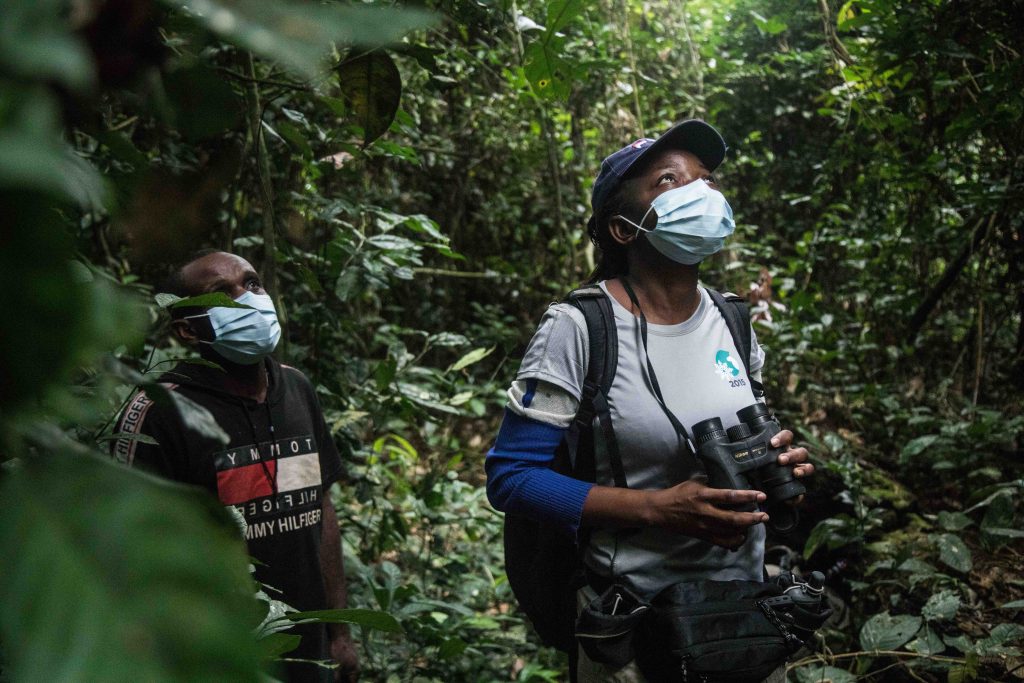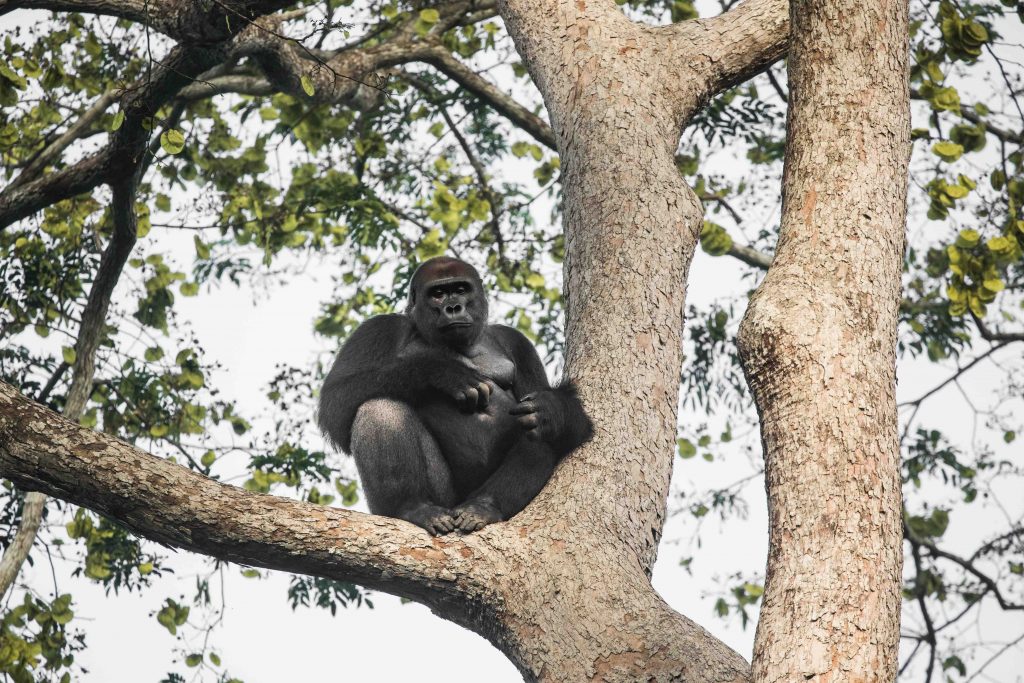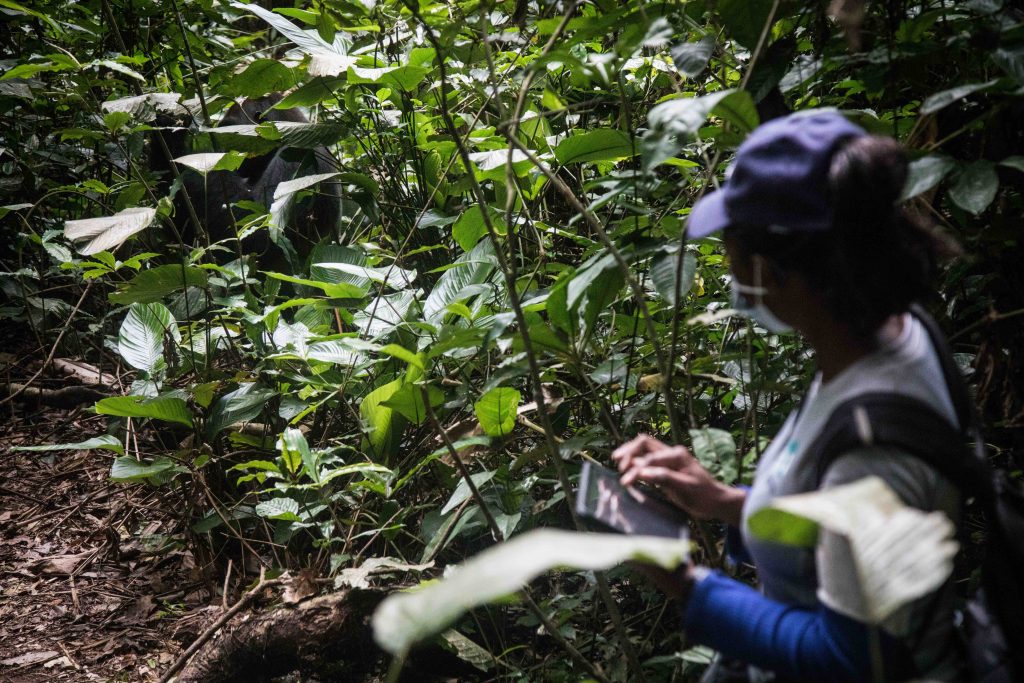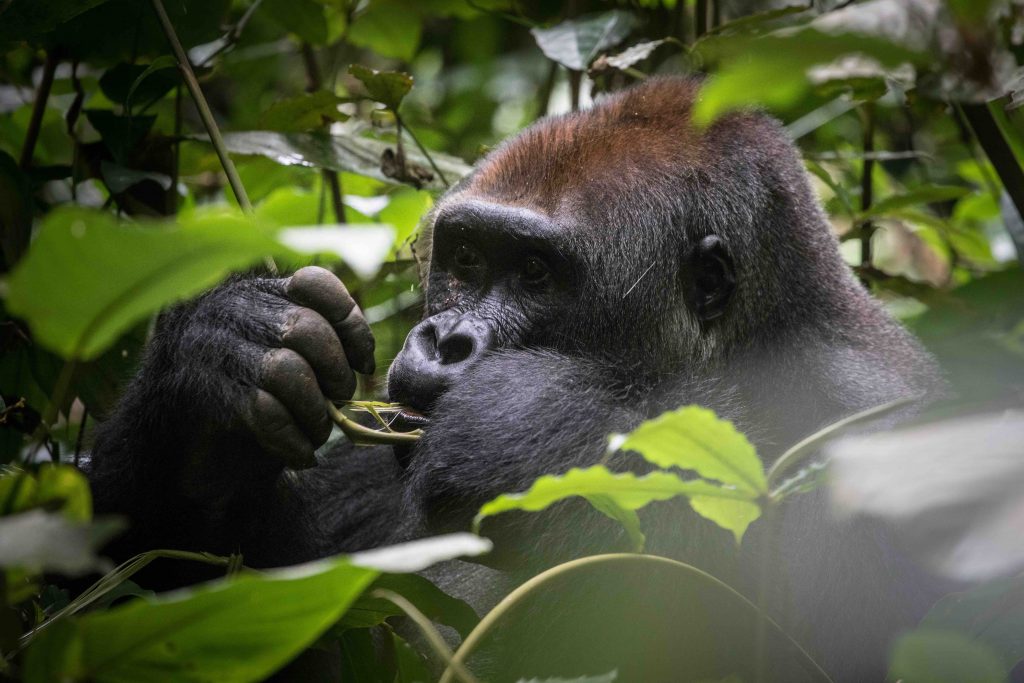“Congolese women think they don’t belong in the forest. But we do!”
For some reason, Esther has always dreamed of working in the forest. Despite the predominance of men in this field, she made a place for herself as a research assistant in the heart of the Nouabalé-Ndoki National Park, and showed that research is open to all.
 Esther, watching a group of gorillas feeding on fruits up in a tree © S.Ramsay/WCS
Esther, watching a group of gorillas feeding on fruits up in a tree © S.Ramsay/WCS
“I don’t know why I always wanted to be in the forest,” says Esther Nkoussou, shrugging her shoulders as she packs to get ready to go gorilla-tracking, deep in the Congo Basin forest.
For a year now, Esther has been working as a research assistant in Mondika, observing habituated gorilla groups and collecting behavioral data from dawn till dusk. “Honestly, it’s not an easy job, but if you know what you want, it works” she explains, smiling, “I adapted quickly, it took me three weeks to feel comfortable”.
Mondika is a research camp located in the periphery of Nouabalé- Ndoki National Park, in the northern Republic of the Congo. The Wildlife Conservation Society (WCS) manages the site on behalf of the Congolese Government, through an innovative Public-Private Partnership (PPP) for delegated protected area management. As an important future site for wildlife-based tourism, Mondika benefits from the generous support of the United States Agency for International Development (USAID) through its tourism expansion activity.
Esther is the first female Congolese research assistant to be hired in Mondika for 15 years, a research site created in 1995 by Dr. Diane Doran-Sheehy, where female leadership is almost a tradition. The previous site manager, Alice Zambarda, has played a big role in Esther’s swift adaptation. “I saw Alice as a mentor, who coached me on how to behave, we worked on the ground, she gave me courage,” she explains.
Esther’s story with the forest also dates back to the 1990s, when, as a teenager, she saw the Mayomb forest for the first time: “I could see the forest from the train as I passed. I didn’t really have any idea what was in it, and was curious to know”.
It is this insatiable and inexplicable curiosity for the forest that has led her to where she is. “I remember the first time I entered a forest was in Brazzaville, in the ‘Patte-d’oie’ forest [an urban, artificial acacia forest]. It gave me a first idea, and I was already wowed.” Esther then studied forestry, and worked for the National Reforestation Service.
“Women generally like secretarial work, being in an office. I wanted to work in the forest, and see where it would take me” she explains. “Some people thought it was cool, because not many women do this. Some were doubtful. It motivated me even more.”
When asked how it is to work in a male-dominated field, Esther shrugs again: “I like it, I have always worked with a lot of men, even during my studies. I’m used to being in a male environment.” To her, “the most important thing is to be welcomed, not to feel any difference, whether you are a woman or a man. Mutual respect and esteem can only be achieved by letting go of prejudices.”
Data are collected on a tablet, at a safe distance from the gorillas, while wearing a surgical mask to prevent disease transmission to the apes. © S.Ramsay/WCS
Four days out of five, Esther is in the field, walking in the dense vegetation, looking for western lowland gorillas, then thoroughly recording every aspect of the group’s life. Every vocalization, interaction, move, is a precious addition to a more than 20 year old database that helps understanding this critically endangered, and most under-studied species of great ape.
“In the forest, there is something exceptional that I can’t explain. A certain chemistry that I’m attracted to” she explains, lacking words to explain her life-long fascination. Yet “for women, the forest is something to be afraid of”, she deplores.
To Esther, this is due to misinformation and incorrect preconceived notions. “People have a mistaken view of these professions,” she says, “the job of a research assistant is no more problematic for a woman than for a man.” Not everyone can adapt to the forest, where the living conditions are fairly basic, but Esther does not believe that this is something changed by gender.
Data collection is necessary for a better understanding of gorillas, to allow a more efficient protection of this endangered species © S.Ramsay/WCS
“Women should be encouraged to apply more. In today’s world, women must aspire to the same positions as men” explains Esther. And she intends to set an example, and to see her career progress. “I can’t say I want to stay an assistant, but I have to take it one step at a time. I’d like to do a training course in five years’ time, so that I can continue to progress.”
Her only condition for her future is the same as it has been since she was a teenager: “The main thing is to stay in the forest, and in Congo!”.





Pingback: Verhalen uit Mondika – Gorilla Stichting Nederland